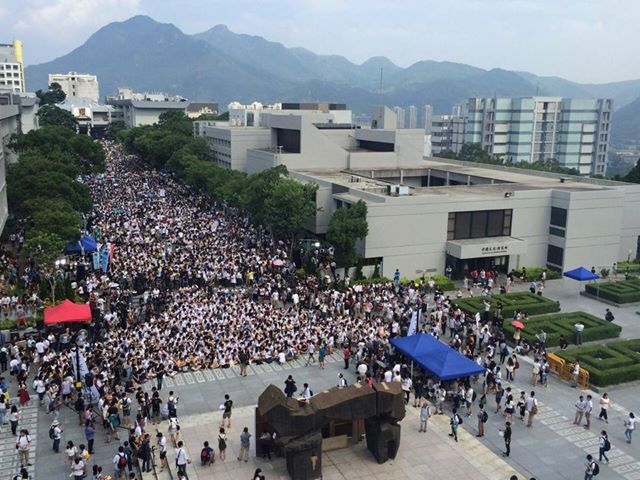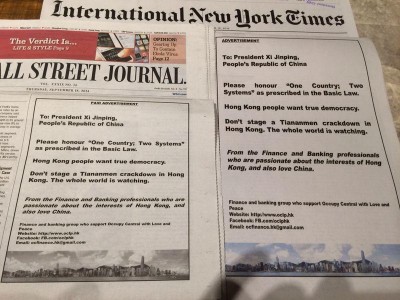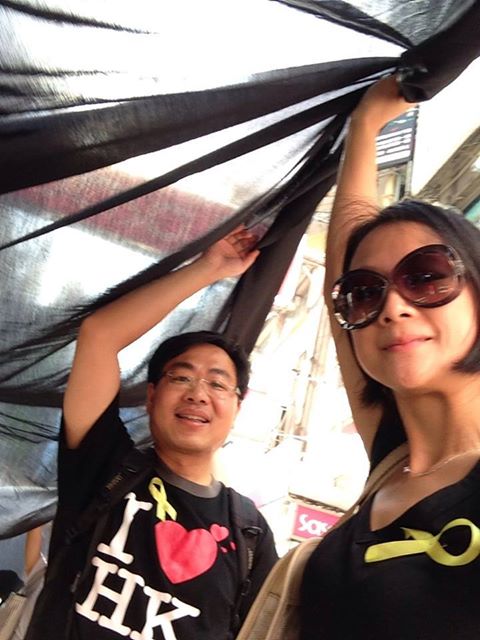
Thousands of students joined the class boycott assembly at the Chinese University campus on 22 September. Image from inmediahk.net.
Student activist groups in Hong Kong have begun to boycott their classes for at least one week to demand that Beijing allow the city to hold a genuine democratic election in 2017 for its next chief executive.
The Federation of University Student Unions and Scholarism, a high school student activist group, are also hoping the boycott will build momentum for a massive sit-in dubbed Occupy Central which will likely take place in the financial district around the same time as China's National Day on 1 October 2014. The protest intends to make it clear to the Chinese government that Hong Kong's people will not accept its undemocratic plans for the election of the city's top leader.
Former British colony Hong Kong enjoys a certain amount of autonomy from China as a special administrative region under the “one country, two systems” principle. Beijing has promised the city a direct vote in 2017, but says a nominating committee stacked with pro-Beijing members will select the candidates.
To contain the spread of protests in recent weeks since the nominating committee was announced, pro-Beijing groups and media outlets have ramped up the pressure on those demanding democracy, insisting that nothing will change Beijing's decision. As high school students also joined the class boycott, the pro-Beijing camp has also accused Occupy Central organizers of “using” innocent students as their political tools and set up a hotline for students and parents to report those who incite class boycotts at schools.
A top Beijing official has claimed that China is prepared to adopt “prompt and harsh” action if the planned sit-in becomes out of control.
Furthermore, a fabricated written record of a seminar in which protest organizers spoke to the English-speaking community of Hong Kong has spread the suggestion on social media that foreign forces are operating behind the scenes. The record put words into the mouth of seminar participants that only a Hong Kong version of the 1989 Tiananmen Square protests complete with the bloody crackdown could pressure the Beijing government into introducing genuine democratic change and that the US government would be prepared to support the students in the strike by helping them to enter top universities. Some believe that the fabrication is meant to put the blame on the organizers for a possible violent crackdown on the sit-in.
Pro-democracy groups have responded by taking out an advertisement in international newspapers urging Beijing not to stage a violent crackdown in Hong Kong.

The advertisement in The New York Times and The Wall Street Journal urged: “Don't Stage a Tiananmen Crackdown in Hong Kong. The Whole World is Watching.” Image from Hong Wrong.
T-rexx, a indie music singer and news commentator, described the political pressure dissents are facing these days on citizen media platform inmediahk.net:
前幾天,有網上平台的街訪訪問了一個中六生,談政改看法,那學生說不支持假普選,希望可以公民提名選特首。片段旋即被反佔中人士放上網嘲諷,不出半日,這青年已被一班老而不「問候」得體無完膚。這種壓力不是人人受得起,捱不到當日黃昏,這青年電郵到網站,希望他們把片段刪除,不要再播。
A few days ago, an online platform interviewed an upper high school student about his view on the electoral reform. The student said he would not support fake universal suffrage and wanted citizen nomination for the chief executive election. Soon after the video was uploaded, anti-Occupy Central groups started bullying him with foul language. Not so many people can withstand that kind of pressure and in less than 24 hours, the student emailed the website and requested that they take down the video.
In fact, T-rexx himself has become a target of political threats:
昨天,如常有人在網上罵我的文章,新動作是焚燒有我舊照片的學校年刊,還把燒書照片放上臉書廣傳。看了焚書照,我忽然想,明天我出街是否要擔心被人坑儒?
Yesterday, as usual, people attacked me online because of what I had written. Their latest tactic was burning my photo from the yearbook [implying that they know the real identity of the writer] of my old school and uploading the photo of them burning it onto Facebook. I looked at the photo and wondered if I should be worried that I would be physically attacked by someone when I was walking in streets tomorrow.
Though the kind of pressure mentioned in T-rexx's post is more psychological, actual political prosecution is becoming more common. On September 20, the Hong Kong police decided to prosecute more than 18 activists who had participated in a protest against land acquisition for the controversial Northeast New Territories development project in June under charges such as “illegal gathering” and “forced entry into the building of the Legislative Council”. The prosecution was highly selective as more than a few thousand people were involved in the June protests outside the Legislative Council, the city's legislature, but the police zeroed in on those who are more likely to take up leading roles in the upcoming massive sit-in.
Many worry that the above tactics may weaken Occupy Central's mobilization and impact. Political scientist Ma Ngau, who is a also supporter of pro-democracy movement, is not optimistic. He pointed out in an interview with inmediahk.net:
兩個運動同樣強調「可控性」、「不影響日常生活」,對於當權者的危機未必太大。他認為歷史上的公民抗命運動則是不斷製造危機,令政府「收唔到科」,面臨鎮壓與民主化之間的選擇。佔中之後,馬嶽認為深入各層面的不合作運動將是關鍵,港人亦要有活在威權體制下的心理準備。
The two protests [class boycott and Occupy Central] both put too much stress on “under [organizers’] control” and “would not affect everyday life”. The authorities won't feel the pressure of the crisis. Looking at past political history of the world, civil disobedience means continuous attempts to create crisis to the extent that the government loses control and has to choose between launching a violent crackdown or democratizing. After Occupy Central, whether or not that civil disobedience can penetrate into all levels of society is the key and Hong Kong's people need to be psychologically prepared to withstand the pressure from the authoritarian rule.
Ma is among the 500-plus university professors who have expressed their support for the student action and will give “street lectures” to the protesting students.
In addition to local mobilization, international groups had joined the Yellow Ribbon campaign initiated by the Civic Human Rights Front of Hong Kong and organized a Global Solidarity Day to show their support for pro-democracy protesters in Hong Kong. For more, read Hong Wrong's “International Groups Organise Pro-democracy Yellow Ribbon Solidarity Events.”








8 comments